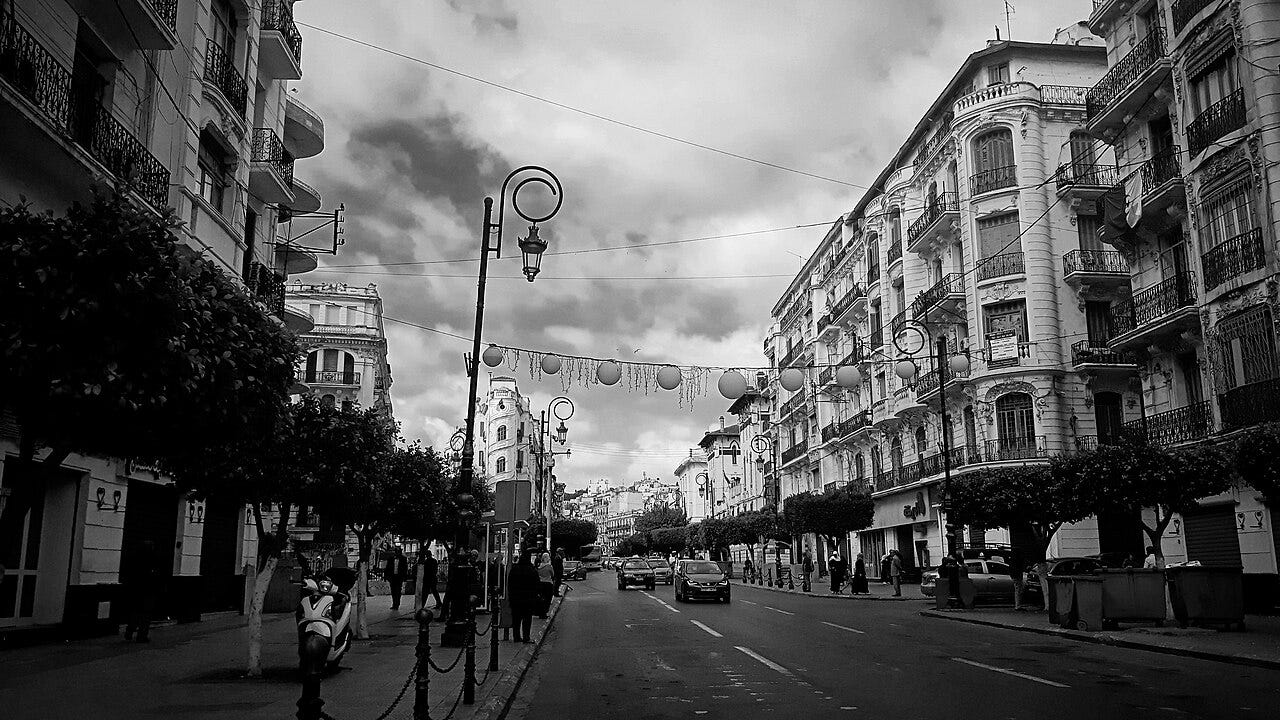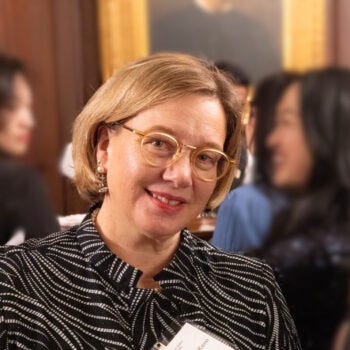ICWA@100: The unlikeliest of reunions
A mounting power struggle split families in 1990s Algeria.
Katherine Roth Kono is a New York-based writer, former ICWA fellow and current trustee. She was a longtime correspondent and editor at the Associated Press. Her focus has been on cultural deep-dives and finding ways to bridge cultural chasms by focusing on shared humanity. She first worked for Reuters and Radio France Internationale in Paris before heading to Cairo on a journalism fellowship from the National Council on US-Arab Relations, after which she stayed on as a reporter. One of her most widely read feature stories for Reuters was about a soft-spoken, seemingly stateless man who lived for years in Charles de Gaulle Airport. The story later evolved into the film “The Terminal.” She later covered the front lines of the Yemeni civil war for Agence France-Presse.
Katherine spent her ICWA fellowship (1993–1995) in Saudi Arabia, France, Algeria, Yemen and Egypt, studying tradition and modernity in the Arab world. This June 1993 dispatch from Algiers reports on the personal cost of conflict to families in a community very much on edge.
ALGIERS (June 1993) — It was the unlikeliest of reunions and took place in the shadow of a mosque known to locals as “Kabul,” named for the Afghani-trained Muslim extremists who used to hold meetings there. The Islamist smiled warmly as he lifted the ornate Algerian teapot to pour fragrant glasses of mint tea for the two police officers.
The three spoke haltingly of recent events. The assassination of the Berber journalist and poet Tahar Djaout. The fact that gunfire is now heard in broad daylight in heavily populated neighborhoods of the capital, and that many women in the neighborhood no longer go shopping on Fridays, traditionally the biggest market day, because of frequent clashes between Islamists on their way to the mosques and security forces. At that point, the conversation eased into more mundane topics. The rising price of tomatoes. The heat and humidity of summer.
Then there was a pause in the conversation. “Anyway, we’re all Muslims and there’s no reason we can’t get along,” said the Islamist to his nephews. “Of course not,” replied his nephews, both police officers. “This is just a difficult time, and it will pass,” said the eldest of the two. This type of interchange has become typical in Algerian families, many of which are collapsing in the face of the current power struggle that threatens to destabilize the country.
One story currently circulating in Algiers is that of a group of police officers who go to an apartment to arrest some Islamic militants. Before entering the premises, Mohamed, one of the police officers, sees that one of the militants is his cousin. He tries to intervene on his cousin’s behalf, but his superior says they must go on with the bust. Instead, the officer suggests Mohamed listen from behind the door so as not to be seen by his relative. The interrogation begins. When the officer asks who the next person on the hit list is, Mohamed is shocked to hear his own name.
“Our family is all mixed up. My uncle on the third floor is RCD (the more militant of the two Berberist parties). I have another uncle on the other side of the building who is FFS (the other Berber party). My other uncle and cousins are Islamists, and my father supports the ruling FLN party right down the line, which I think is ridiculous. I’m neutral and try to stay out of politics,” explained one of the two police officers as we sipped our tea. He said the family holds together by avoiding political discussions.
But some Algerian families are not that fortunate. Cases of interfamilial arrests and assassinations are becoming increasingly common, and if putting individual beliefs first is a sign of modernity, Algeria has certainly made the grade. But as striking as the cases of policemen turning in their brothers and sons and Islamic militants turning on family members, are the cases of tolerance and lasting friendship in this increasingly violent situation.
Abdel-Kader Hussein (not his real name) seems much like any American youth. He likes rock music and flashy clothes and joking around with his buddies. He teases people mercilessly, but with charm and a smile that somehow lets him pull it off. After introducing me to a security guard friend of his, he chuckles and adds: “Oh well, it doesn’t matter whether you know his name or not because he’ll probably be killed tomorrow anyway.” During the recent Eid al-Adha holiday, when Muslims slaughter lambs to commemorate God’s intervention to spare the life of Abraham’s son Isaac, Abdel-Kader and his Islamist brother helped their uncle slaughter the family lamb. Midway through the slaughter he turns and says: “Look at this bearded guy next to me. You see how much he loves violence. It’s because he’s a fundamentalist.”
As the conflict between Algerians who favor an alternative Islamic state and those determined to defend their secular lifestyle grows hotter, individuals like Abdel-Kader, who seem able to walk the line between the two camps, are becoming increasingly rare. “If you’re not for the cause you’re against it,” explained an Algerian grocer before a recent rally against terrorism. “If you don’t participate in the rally, you are demonstrating against it.”
“You can’t believe some of the fights we’ve had in our family, doors slamming and cousins storming away from dinner conversations,” said a young Berber woman. “I have an Islamist cousin who doesn’t talk to anyone in the family anymore. But what am I supposed to do?”
The different sides of the battle are inextricably wound together here. Islamists hold positions at all levels of the government structure, and many of those against political Islam find themselves at odds with friends and family. There are opponents of political Islam in even the most Islamist ghettos. There are also Islamists who drive a Mercedes home to their villas in chic upper-class neighborhoods where most of the residents are ministers and army officers. It’s a matter of individual choice and seems to have little to do with class, region, ethnicity or gender.
“We should not be putting the emphasis on a political consensus, but how we can manage to live together. The stakes are high, and at the extreme, this could lead to civil war,” said Rachid Mimouni, a respected Algerian writer and one of the few internationally acclaimed intellectuals still left in the country (others have either been assassinated or moved abroad).
Clashing views on personal liberty and what role religion should play in a modern Arab state divide all levels of society here, and a peaceful middle ground seems about as possible as a snowstorm in Tamanrasset.
For now, having tea with the family is as close as most folks come to successful negotiation.






Took me a while, but I DID find it. Well done!